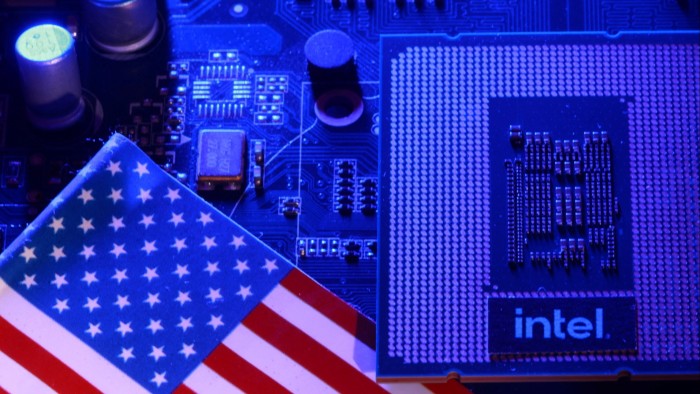Unlock the White House Watch newsletter for free
Your guide to what Trump’s second term means for Washington, business and the world
At first glance, the fact that Intel’s shares have traded up since it emerged that the US wanted to become its biggest shareholder looks perverse.
After all, the $8.9bn the chipmaker will receive had already been promised, in the form of grants under the country’s 2022 Chips Act. Handing over 10 per cent of the company for no extra money hardly looks like a good deal for shareholders, and could still result in legal challenges.
Also, having the US as an equity investor might actually make Intel less valuable, not more, starting with the fact that its board may be more susceptible to political influence. Washington will not be given a board seat or, on most company actions, get a vote. But President Donald Trump has rarely seemed constrained by conventional governance considerations when it comes to throwing his weight around.
In a regulatory filing this week, the company listed other downsides to having Uncle Sam on the shareholder register. Among them: It may hurt its business outside the US and make other strategic deals it wants to pursue less likely. Wall Street’s reaction, though, seemed to reflect a belief that, by becoming a large shareholder, the White House is in some way signalling stronger backing for Intel as a national chip champion. This may represent the triumph of hope over reality.
Having the US as an anchor investor has at least resolved one financial uncertainty. Trump has long railed against the Chips Act grants, raising a doubt over whether he might try to block the payments, so the new arrangement at least guarantees Intel will get the cash. And unlike the grant money, the equity investment comes with less explicit strings attached, so if the company changes course and cuts back on its manufacturing plans, it should still get the cash.
But investors also seem to be betting that, as a big shareholder, the US has more of an incentive to make sure the company succeeds. It is hard to see why. Investment cycles in the chip industry are much longer than the cycles of presidential politics, so any financial upside from this investment may be far off. On the other hand, the political cost of an Intel failure would be equally devastating, whether taxpayer money was advanced as a grant or an equity investment.
If the Trump administration’s 10 per cent stake doesn’t appear to do much on its own to improve Intel’s prospects, what more would Washington have to do to make a difference? One obvious answer is: Provide more cash. Since Intel’s free cash flow turned negative in 2022, it has burned through nearly $45bn. New chief executive Lip-Bu Tan has embarked on another round of deep cost cuts, but there is no end in sight yet for the steep investments needed to return Intel to the leading edge of advanced chip production.
The $2bn committed by SoftBank last week is a reminder that Intel still has plenty of financing options. But, given its inability to find customers for its latest advanced manufacturing process, known as 18A, a need for further government support can’t be ruled out. That could be costly for shareholders. The White House has set a precedent by taking equity, and would probably demand an even bigger slice of the company for future support.
Recommended
The biggest hurdles in Intel’s attempted turnaround, meanwhile, have nothing to do with cash. It needs to master the latest advanced manufacturing processes to put itself back in competition with industry leader TSMC, persuade other companies to have their chips made in its new fabs, and make up for completely missing the chip industry’s AI boom by designing a more competitive line of new AI chips of its own.
Washington can’t help with the first and last of these. But an interventionist White House could cajole companies such as Nvidia and Apple to become customers for Intel’s next advanced process, known as 14A. Without anchor customers, Tan has warned that he will abandon his company’s attempts to stay on the leading edge of chipmaking altogether. Treasury secretary Scott Bessent has said that the Trump administration doesn’t intend to drum up business for Intel: Wall Street appears to hope otherwise.
The US didn’t need to become a big Intel shareholder, however, for this issue to come to the fore. Given the national and economic security interests at stake, it already had good reason to act. Perhaps, as Wall Street seems to believe, becoming an owner is a sign that the White House is ready to take a more active role. Perhaps other companies will now feel more confident that Intel will stay the course in advanced manufacturing, making them more likely to sign up to have their chips made in its fabs. But there has been little to support those hopes.
[email protected]



